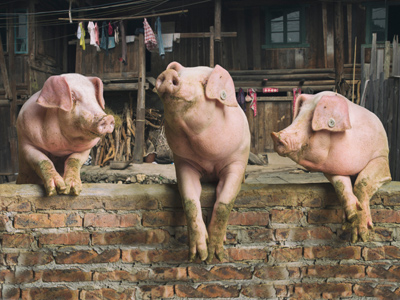
Animal Farm - Dialogue
This Literature quiz is called 'Animal Farm - Dialogue' and it has been written by teachers to help you if you are studying the subject at high school. Playing educational quizzes is a user-friendly way to learn if you are in the 9th or 10th grade - aged 14 to 16.
It costs only $12.50 per month to play this quiz and over 3,500 others that help you with your school work. You can subscribe on the page at Join Us
This high school English Literature quiz takes a look at dialog in Animal Farm by George Orwell. “Dialogue” is the term used to refer to any direct speech in literature. Technically it means a conversation between at least two people. Dialog is a significant aspect of characterisation. A reader learns much about a character through paying attention to the style and content of a person’s speech. Characters in Animal Farm are sharply distinguished by the style and content of their dialog. Benjamin’s quiet cynicism fits his character as much as Clover’s reluctance to express open disagreement fits hers.
"It appears to me that that wall looks different. Are the Seven Commandments the same as they used to be?"
"Comrade, those ribbons that you are so devoted to are the badge of slavery. Can you not understand that liberty is worth more than ribbons?"
"Four legs good, two legs bad! Four legs good, two legs bad!"
"Man is the only real enemy we have. Remove Man from the scene, and the root cause of hunger and overwork is abolished for ever"
"Donkeys live a long time. None of you has ever seen a dead donkey"
"Discipline, comrades, iron discipline! That is the watchword for today. One false step, and our enemies would be upon us. Surely, comrades, you do not want Jones back?"
"I will work harder"
"I have no wish to take life, not even human life"
"The enemy both external and internal has been defeated"
"Snowball has done this thing! In sheer malignity, thinking to set back our plans and avenge himself for his ignominious expulsion, this traitor has crept here under cover of night and destroyed our work of nearly a year. Comrades, here and now I pronounce the death sentence upon Snowball"
Ready for more?
not all...
quizzers. Try to win a coveted spot on our Hall of Fame Page.







